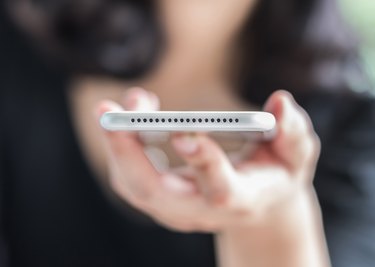
Technology makes it easy to secretly record phone conversations, but knowing the legal consequences before making a recording or revealing a recording is imperative. Simple devices are adequate for recording up close and specialized recording devices are made for concealment and for operating when not present in a room for specific space.
Recording with Phones
Video of the Day
Recording a conversation with a phone is very easy using several different tactics. The first is simply using the video feature on the camera to record while having a conversation. Leave the phone in your pocket or turned upside down on a table to record clearly.
Video of the Day
Apps are made specifically for recording audio as well. Android apps to record phone calls secretly function about the same as those found on iOS. Journalists, businesses and professionals can benefit from recording meetings and interviews, and these apps largely serve this purpose. Some are meant to record external audio, acting like an old fashioned tape recorder and others record internally for actual phone calls.
The apps capable of recording phone calls make it exceptionally easy to record a conversation because there is no visibility. Recording an in-person conversation requires concealment and the user always runs the risk of being caught.
Hidden Recording Devices
The best way to secretly record audio is not always with cell phones. Phones are convenient and are capable of hiding in plain sight because they are so prevalent but they require a user to be present for functionality. Secretly recording when not present or through a better concealed device is more effective, especially under suspicion.
The primary issue with recording is storing the audio file. Audio is space-intensive and it requires a storage device to hold that data. The old school tape recorders remain relevant and work well but they are bulky and the tape can make noise. Digital recording devices are the best way to secretly record audio without detection.
Many devices are available, with some being exceptionally well made for concealment. The pen recorder is a favorite because it blends into just about any environment and stores easily in an exterior shirt pocket for a clear recording. Some pen recorders are capable of storing over 100 hours of audio with a full day or more of battery life.
USB recorders are also popular. The device looks like a USB drive because it actually is a drive. The drive charges in a USB outlet and it holds large amounts of audio, making it ideal for recording long periods of time without being present.
Know the Law First
Study the call recording laws by state to know if the recording is usable or admissible in a court. Secret recordings are useful for capturing evidence of verbal abuse or violations of the law but capturing the audio is not always legal. Many states require consent from one party or from both parties. This means you must tell the individuals involved in the conversation about the recording prior to beginning the conversation.
On the federal level, a recording is often considered a wiretap. In order to perform a wiretap, consent is required or a legal approval to perform the wiretap is required. In most cases, this involves a warrant issued by a court and administered by law enforcement personnel. The wiretap applies to conversations that are assumed private, however, which leaves some wiggle room for coworkers speaking casually in a public space and other similar situations.
Before recording and especially before revealing a recording, consult with a lawyer and know the potential legal ramifications. Even in the case of being a victim yourself, a secret recording that violates the law places you in potential legal jeopardy.